Displaying items by tag: Joan Hickson
Sleeping Murder/ 1985
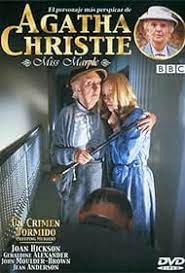
SLEEPING MURDER
UK, 1987, 102 minutes, Colour.
Joan Hickson, Geraldine Alexander, John Moulder-Brown, Frederick Treves, Jean Anderson, Terrence Hardiman, John Bennett, Jack Watson.
Directed by John Davies.
Agatha Christie’s novels were enormously popular in the 20th century, many film and television series made. And, they continue into the 21st-century, new Poirot films, continued streaming screening of Miss Marple stories and those of Poirot.
While Angela Lansbury and Margaret Rutherford did portray Miss Marple, the main screen presentations were by Joan Hickson, Geraldine McEwan, Julia Mackenzie. It is interesting that the stories with the latter two Miss Marples was somewhat updated, the films with Joan Hickson had the post-war atmosphere, the late 1940s, the 1950s, life in the village, costumes and decor, vehicles, religious observance, traditional values…
This Miss Marple story is somewhat different. Usually there is a police Inspector who dislikes the interference of Miss Marple but then has to work with her to solve the crime. In this film, the crime happened 20 years earlier, the disappearance of a young woman, allegedly going off with a male and not heard of afterwards. As a young couple, who have spent some time in New Zealand, drive along a country road, the wife sees a mansion and feels that it is just right for them. Which leads to some sense of déjà vu, re-experiencing some horror from the past.
As the mystery unfolds, the couple do the detective work themselves along with Miss Marple. There are several possibilities for murder, three men in the village who are investigated, and the half brother of the disappeared woman, the local doctor. Then, just as a witness is to help solve the case, she is murdered and, at last, the police do intervene.
It is interesting that in this particular story, the murderer is in plain sight.
- The popularity of Agatha stories? Miss Marple? The various actresses? Joan Hickson?
- The Joan Hickson movies, closer to the novels, the post-war settings, the English village, costumes and decor,, manners and proprieties? The musical score?
- The title, advice about the past, let sleeping dogs and murders lie? The dangers of uncovering the past?
- Miss Marple, the connection with her novelist nephew, his friends and their house? The reputation? Investigations, questions, going to shops, getting information? Confidante of the couple?
- A different Miss Marple story, the couple doing the investigations, her help, police arriving only after the murder towards the end?
- Giles and Gwenda, newly married, New Zealand, her background, India, gradual revelation of time in England? The secrecy about events and her father? Driving, her seeing the house, attracted, the tour with the agent, a scream at the top of the stairs? Foreboding? Redecorating, wanting the door and later discovering it was there, wanting steps and discovering the previous steps? The wallpaper, the flower patterns? Her becoming edgy, the invitation to London?
- Miss Marple, her nephew, his critical wife, going to the theatre, The Duchess of Malfi, Gwenda screaming, the words, the later repeating? The embarrassment, her worrying whether she was going mad?
- The advertisement for information, the doctor, his invitation, half brother to the missing woman, his being a doctor in the town, clients, many years, his visits, the letters from Helen, loss of contact? His benign interest and help?
- The uncovering of the real situation, Gwenda, her father in India, widowed, the voyage home, the encounter with Helen, marrying her, a year, suspicious behaviour, the story of her running off with someone, disappearing? The effect on the father, mental deterioration, institution, suicide? The visit to the institution to find out more?
- The men friends, the lawyer in the town, engagement, his being in India, the break off, the return, working in the town for 20 years? Morning tea with his mother, her views on Helen?
- The salesman, criticisms of him as loud, tracking him down, the couple pretending to hire a bus, the discussions about Helen, his being sorry for her, his flashy car and the reports of flashy cars?
- The Colonell and his wife, in Northumberland, the visit, the wife suspicions, Gwenda going back for the hearing, the conversation with the Colonel and hearing the truth?
- The servants, Miss Marple in the interviews, the flashbacks to what happened on the night, the maid at the pictures, her covering, Helen’s voice and not being afraid?
- The maid, her husband, seeing the ad, writing the letter to the doctor, coming to give testimony, her motivations, some money? In the fields, strangled?
- Help of the gardener, his memories of the past?
- Waiting for the maid, Giles and Gwenda and the doctor, her being discovered murdered, the police inspector?
- Miss Marple, her theories, the writing on the notes and checking out the authenticity, talking with the servants? Calling the inspector aside, the plan?
- The mysterious arrival, the threat to Gwenda, the hose, the doctor and his unmasking? His motivations, possessiveness, controlling Helen, the story of the tennis net cut, her foot injury, the reputation of the other men coming from the doctor, also the story is about her father, his actually fostering the delusions of the father?
- Satisfactory murder mystery, the past, detection and investigation, unmasking?
Pocketful of Rye, A/ 1985
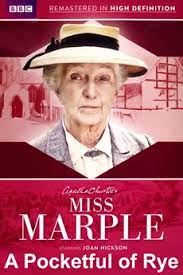
A POCKETFUL OF RYE
UK, 1985, 103 minutes, Colour.
Joan Hickson, Tom Wilkinson, Timothy West, Peter Davison, Fabia Drake, Stacy Dorning, Martyn Stanbridge, Clive Merrison, Rachel Bell, Frances Low, Selena Cadell, Mira Lena Kendall, Frank Mills, Jon Glover, Anette Badland.
Directed by Guy Slater.
Agatha Christie’s novels were enormously popular in the 20th century, many film and television series made. And, they continue into the 21st-century, new Poirot films, continued streaming screening of Miss Marple stories and those of Poirot.
While Angela Lansbury and Margaret Rutherford did portray Miss Marple, the main screen presentations were by Joan Hickson, Geraldine McEwan, Julia Mackenzie. It is interesting that the stories with the latter two Miss Marples was somewhat updated, the films with Joan Hickson had the post-war atmosphere, the late 1940s, the 1950s, life in the village, costumes and decor, vehicles, religious observance, traditional values…
There is a tenuous link with Miss Marple here, her recommending a maid who served in the house where murders occur.
Timothy West opens the film with great bombast, an unlikeable character, and murdered. His name is Rex – and the beginning of the link of the title with the nursery rhyme the king in his counting house, and the murderer choosing various clues from the rhyme for the development of the plot.
This time there is a very sympathetic police inspector, played by Tom Wilkinson more than a decade before his emerging so successfully in The Full Monty. Character actress, Fabia Drake, is also a strong screen presence.
The background to the murder is a mine in Africa and Rex betraying his partner. Rex has two sons, one in the business at home, the severe and humourless man, the other is Lance, in Africa, disliked by his father but returning to make him a proposition.
The plot is rather complex, according to the rhyme, and depends on truth about times.
- The popularity of Agatha Christie novels and films? The actresses as Miss Marple? Joan Hickson?
- The post-war settings, costumes and decor, cars? More proper ways of behaviour?
- The nursery rhyme and the title, the plan to crimes according to the rhyme, the king in his counting house, Queen and tea, the maid and the washing…?
- The opening, the focus on Rex, at the office, his laughter, the deals, his sudden attack? His death? His presence in the flashbacks, at home, dominating, sneering, his treatment of everybody in the family? Meals, behaviour? Intensely disliked? The fact of his marrying Adele, family criticisms, her age and the difference, issues of money?
- The family, the financial situation, the two sons, one at home and carrying on the family business, severe, the treatment of his wife, brutality and disdain? Her present the household, cheerful? Put upon? Her friendship with Adele and her support? The absent son, Lance, in Africa, in disfavour with his father?
- Mary Dove, the management of the household, working with the servants, especially with Gladys and the family’s criticism of her and her accidents? Financial management? Interactions with Rex? Her being formally correct with Adele and the other members of the family?
- Miss Henderson, age, sister-in-law to Rex, critical observations, haughty, despising Adele, the attitude towards her nephews? Observing what went on in the household?
- The cook, the attitude towards Gladys, her husband and his laid-back manner? The cook and her being upset?
- Gladys, the recommendation from Miss Marple, awkward, accidents? Her strange behaviour, phone calls, going out? Found dead? Lance and his commands, her infatuation, the rye…?
- The arrival of the police, the Inspector, initially wary of Miss Marple, liking her, seeking her advice, following it? His assistant?
- Suspects for the death of Rex? The mystery of the death of Gladys? Then the murder of Adele? Adele and her relationship with the tennis coach, suspicions, his leaving, his being apprehended and interrogated?
- Lance returning from Africa, with his wife, their bonding, her past, the arrests, saying she was bad luck?
- Coming back, the background of the mine in Africa, his father’s behaviour, the partner, the descendants and their being edged out of money? Lance and his rather carefree attitude, with everyone in the house, with Miss Marple?
- Miss Marple and the Inspector, following the nursery rhyme, unravelling the mystery? The importance of the timing? Lance and his lies, the past connection with Gladys and leading her on? His being unmasked? The truth about the mine, his arguments with his brother, seeming to compromise with the payoff, but his getting the money, leaving the airport, with Patricia, the crash?
- Mary Dove and the finances?
- Jennifer and the revelation of her identity?
- A satisfactory mystery, the suspect and the laying of false clues? And the role of Miss Marple?
Murder at the Vicarage, The/ 1986
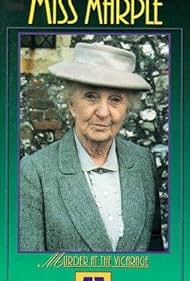
THE MURDER AT THE VICARAGE
UK, 1986, 102 minutes, Colour.
Joan Hickson, Paul Eddington, Cheryl Campbell, Robert Lang, Polly Adams, James Hazeldine, Norma West, David Horovitch, Ian Bramble, Rosalie Crutchley, Barbara Hicks.
Directed by Julian Amyes.
Agatha Christie’s novels were enormously popular in the 20th century, many film and television series made. And, they continue into the 21st-century, new Poirot films, continued streaming screening of Miss Marple stories and those of Poirot.
While Angela Lansbury and Margaret Rutherford did portray Miss Marple, the main screen presentations were by Joan Hickson, Geraldine McEwan, Julia Mackenzie. It is interesting that the stories with the latter two Miss Marples was somewhat updated, the films with Joan Hickson had the post-war atmosphere, the late 1940s, the 1950s, life in the village, costumes and decor, vehicles, religious observance, traditional values…
The murder victim at the vicarage is a very unpopular old-style Colonel from the village, with his alienated wife, his alienated stepdaughter, imposing himself on the vicar and demanding to examine the books and the finances of the parish. When he goes to do this, he is shot.
With so many people not liking him, and with the ladies of St Mary Mead all gossiping, a mysterious woman coming from Africa and looked after by the local doctor, there are suspects. However, a visiting artist who uses the studio next to the vicarage confesses. Then the wife of the murder victim also confesses, apparently each trying to protect the other because of an affair, but the timing is all out.
One of the pleasures of the film is seeing Yes, Minister’s Paul Eddington as the vicar. There are also some British character actors like Rosalie Crutchley and Barbara Hicks as gossiping ladies. And, again, David Horowitch is the Detective with Ian Bramble as his assistant.
But, as Detective Slade remarks, he expects Miss Marple to be there. He is much more cooperative with her this time and, when the assistant vicar seems to have attempted suicide, the Detective collaborates with Miss Marple in a set up for the murderer to reveal himself.
Miss Marple herself was part of the plot, working in her garden, noting the comings and goings and the times, noticing the rearrangement of the vicar’s office after the murder, especially the large plant in which the revolver had been previously hidden – and recording of a shot set up to confuse the timing of the killing.
Once again, intricate plot, and, this time, the murderer is in plain sight.
- Popularity of Agatha Christie novels? Miss Marple? Joan Hickson’s portrayal?
- The atmosphere of the 1940s and 1950s, post-war, village life, costumes and decor, cars, the church, churchgoing, morals, gossip? The musical score and theme?
- Life in the village, the Vicar and his wife, proper, revelation of her pregnancy, his sermons, do-gooding, shock at the murder? The Protheroes, the colonel, his bombast, wanting to examine the parish books, tense relationship with his wife, stepdaughter, arriving at the vicarage, his murder? The artist, painting the daughter, gossip, the relationship with Mrs Protheroe? The maid at the vicarage, her boyfriend out of prison, meetings? Mrs West, from Africa, terminally ill, relationship with the doctor? Lettice as her daughter, the revelation? Lettice and her wanting to know her mother? And the various gossiping women of the town, their meetings, information?
- St Mary Mead, Miss Marple, her presence, with the ladies, the information, her garden, observing the vicarage, the comings and goings, the time? Her suspicions? The encounter with Detective Slade and Detective West, the past memories, the discussions, the suggestions, their listening to her?
- The artist and his confession, protecting Mrs Protheroe, then her connection protecting the artist? The inconsistencies with the time, their being cited at the vicarage and the studio, the hearing of the shot? The artist later visiting the rectory and discovering the body?
- The resolution of the various subplots around the town, family relationships, the Vicar, Mrs West and her daughter? The doctor and Mrs West?
- Miss Marple, at the scene of the crime, detective Slade’s observations, listening to her? Her suggestions, the assistant at the vicarage, his health, alleged attempted suicide, the phone call wanting to make a confession, the suicide note – and his wanting to confess stealing from the books? Hospital, recovery?
- The role play, the deception, luring the murderer, the revelation of the artist, his relationship with Mrs Protheroe, Miss Marple explaining the timing, the change of the plant, hiding the gun in the plant, the recording in the woods for the shot, the artist changing the time, disabling the figures car, the false phone message?
- Satisfying Agatha Christie plot, Miss Marple resolution, the unsuspected murderer?
Body in the Library, The/ 1984
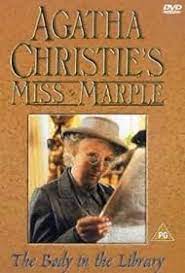
THE BODY IN THE LIBRARY
UK, 1984, 150 minutes, Colour.
Joan Hickson, Gwen Watford, Moray Watson, Valentine Dahl, Frederick Jaeger, David Horovitch, Andrew Cruickshank, Ciaran Madden, Jess Conrad, Trudie Styler, Anthony Smee, Sally Jane Jackson, Raymond Francis, Ian Bramble.
Directed by Silvio Narizzano.
Agatha Christie’s novels were enormously popular in the 20th century, many film and television series made. And, they continue into the 21st-century, new Poirot films, continued streaming screening of Miss Marple stories and those of Poirot.
While Angela Lansbury and Margaret Rutherford did portray Miss Marple, the main screen presentations were by Joan Hickson, Geraldine McEwan, Julia Mackenzie. It is interesting that the stories with the latter two Miss Marples was somewhat updated, the films with Joan Hickson had the post-war atmosphere, the late 1940s, the 1950s, life in the village, costumes and decor, vehicles, religious observance, traditional values…
This is quite a complicated story, a body found in the library of the local lord of the manor, his coming under suspicion, the anxiety of his wife, friend of Miss Marple, the going to stay at the seaside to try to understand the motivation for the murder.
In fact, the plot is quite complex, even to the identity of the body in the library and the revelation of an alternate plot. As always, there is the leading detective and his assistant, many interrogations, complex relationships, and, this time, quite ingenious plotting. This time the Detective is Inspector Slade, played by David Horovitch, humourless, looking down on Miss Marple. However, he was to appear in several more of the Joan Hickson stories, becoming more amenable as the films went on, beginning to expect her presence on the crime scene.
And, with these British television productions, very strong supporting cast of British character actors. Direction is by SilvioNarozzano, Canadian director working in England Who Is most famous film was Georgy Girl.
- The popularity of Agatha Christie mysteries? Miss Marple? Joan Hickson?
- The 1950s atmosphere, the rural villages, the seaside resorts, homes, mansions, the countryside, the hotels, affluence, the beaches? Quite restrained in manners? The musical score?
- The atmosphere of the opening, the maid, the morning, discovering the body, Mrs Bantry, the Colonel, reactions, Colonel Melchett, police, the locals, Inspector Slack, the beginning of the investigations, the police procedures?
- Mrs Bantry, phoning Miss Marple, her coming, looking at the body, the parallels with the village characters? The reputation, Melchett, Sir Henry Clitheroe Scotland Yard, the scepticism of Slack?
- The identity of the body, the hair, the dress, time of death, Miss Marple questioning the dress? The irony of the revelation that it was not Ruby’s body?
- Basil Blake has suspect, the visit, filmmaking, his style, the quarrel with his partner, the timing, his expressing sympathy for Bantry, rejected, the interviews with him, all the details, Slack’s conclusion? The revelation of the truth, his wife, the timing, the body in his house, in the car, the fibres from the rug, driving, seeing Bantry with the puncture, deciding to put the body in his library?
- Mrs Bantry, upset, the rumours in the village, Bantry going to shop, people ignoring him, the man at the counter, and payment? The decision to go to the hotel, with Miss Marple, the management?
- The suspects at the hotel, the manager and his information, Ruby as a dancer, demonstrations, partnering, with the young man, his car being stolen, the coach, tennis, dancing, collaboration with Josie, Josie as Ruby’s cousin, concerned, the timing, the identifying of the body?
- Conway Jefferson, age, death of his wife, children, fondness for Ruby, intention for adoption, the money granted? Adelaide, widow, precocious son, caring for Conway, under suspicion, her financial situation of explanation, wanting to marry again, the man in waiting? Mark, the death of his wife, financial situation, looking after Conway, his exercise, medications? The revelation of his relationship with Josie?
- The mystery of the missing girl, newspaper articles, Slack visiting the father, his explanations, her going out with friends, disappearance, the later interrogating of the girls, Miss Marple and her strict interrogation of the fearful girl, the discovery of the truth, the offer of the part in the film, Mark and Josie disguised, they’re killing her, the substitute body? And the taking of the young man’s car from the hotel, Ruby’s body, incinerating it?
- The young man, mental limits, cycling, following the police, discovering the body, insisting, going to the police, taking the credit?
- The range of flashbacks, the variety of stories, the consistencies and inconsistencies?
- Miss Marple, the suggestions about heritage, Somerset house, her visit, the documents?
- The background of Slack, Lake, their work, interrogations, theories, Slack and his intolerance of Miss Marple?
- The gathering, the explanations, the complexities? The resolution?
Murder is Announced, A/ 1985
A MURDER IS ANNOUNCED
UK, 1985, 153 minutes, Colour.
Joan Hickson, Ursula Howells, John Castle, Renée Asherson, Nicola King, Simon Shepherd, Elaine Ives-Cameron, Ralph Michael, Sylvia Sims, Matthew Solon, Mary Kerridge, Joan Sims, Paola Dionisotti, Kevin Whately.
Directed by David Giles.
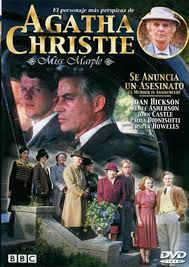 This is the Joan Hickson version of Agatha Christie’s 1950 novel. For many, Joan Hickson is the best embodiment of Miss Marple, very much as Agatha Christie created her.
This is the Joan Hickson version of Agatha Christie’s 1950 novel. For many, Joan Hickson is the best embodiment of Miss Marple, very much as Agatha Christie created her.
This film opens dramatically with the newspaper announcement of a murder to be committed at 7 o’clock at a particular house, a range of people reading the announcement, curious, ensuring that they will be present. The owner of the house, Miss Blacklock, takes a rather detached attitude.
Guests gather at the house at 7 o’clock. The lights go out. An intruder threatens people, there are shots, Miss Blacklock is wounded in her ear, the intruder is shot dead.
As anticipated, so much of the film is interrogations by the rather stern-faced but often kindly detective, played by John Castle. His assistant is played by Kevin Whately, almost like an audition for Morse.
There are many suspects, different clues around the village as with the local military man from India and his ambitious wife and the disappearance of his revolver. There is the unravelling of the identity of the intruder, his Swiss background, conniving for money, relationship with the local waitress.
One of the strengths of the versions of Agatha Christie novels is the strong British supporting cast with veterans like Renée Asherson, Joan Sims and a strong performance by Ursula Howells, holding the film together, as Miss Blacklock.
As some of the people in the village start to investigate, there are further murders, even to Miss Blacklock’s close friend and companion, played by Renée Asherson.
A complex back story emerges, international bankers, marriages, reappearing in-laws, Miss Blacklock’s ailing sister.
For most audiences, the revelation of the truth will be quite a surprise!
- The popularity of Agatha Christie novels, with Joan Hickson as Miss Marple?
- The atmosphere of the 1940s, the look, the lifestyle, customs and presuppositions, costumes and decor, the postwar period?
- The title, the opening, the announcement of the murder, and the papers, Miss Blacklock and the venue for the murder, the gossip in the town, the introduction to the variety of characters, the preparation for the occasion, in the house, buying the sherry, the preparations?
- 7 o’clock, the lights out, the shooting, the torch, Miss Blacklock, cut to the ear, the Swiss man’s death? His background story, the thief, asking for money, the relationship with the maid? The revelation that he did all this for a lark, for the money?
- Inspector Craddock, serious, his range of interrogations, present, shrewd, the conversations with Miss Marple, change of perspective, his manner of treating each of the suspects?
- The Colonel, pompous, India, his wife and her style, the issue of the missing gun?
- Hinchcliff and Murgatroyd, companions, Hinchcliffe and the war experience, their presence, conversations, trying to find out who did it, Hinchcliffe and the solution of where the record was? Murgatroyd realising who was absent? Hinchciffe driving off, Murgatroyd being murdered?
- Bunny, attractive character, a companion to Miss Blacklock, dithery, the story of the past, the trust in Letty, the conversations with Miss Marple, with Inspector Craddock? The death?
- The back story about Letty Blacklock, secretary to the financier, his wife, his sister and children, the mystery of Pip and Emma? Inspector Craddock going to visit the millionaire’s wife in Scotland? The identity of Pip and Emma? The widow, her husband in war, deception, her son, boarding with Miss Blacklock? The revelation? Julia, posing as the cousin, Patrick, Patrick an actual cousin? Their motivations to go to Miss Blacklock, support?
- The vicar, his wife, Miss Marple staying with them?
- Julia and Patrick, it and the house, modern, their attitudes, with Miss Blacklock?
- Edmond, writing the novel, Communist, his mother and her fuzziness? Edmond and his attraction to Philippa, the visits, the conversations?
- The range of suspects, the various clues?
- Hannah, refugee, better, the cook? The revelation about the witness – and Miss Blacklock attempting to kill her?
- The final focus on the woman as being the killer, the issue of the separate doors, the moving the desk, the oiled lock, the torch, the shops, the gun on the floor? The focus on a woman?
- The final visit, Miss Blacklock attacking Hannah, the revelation of the truth, the setup?
- The credibility of the situation, Miss Blacklock and her sister, taking her place, the money issues?